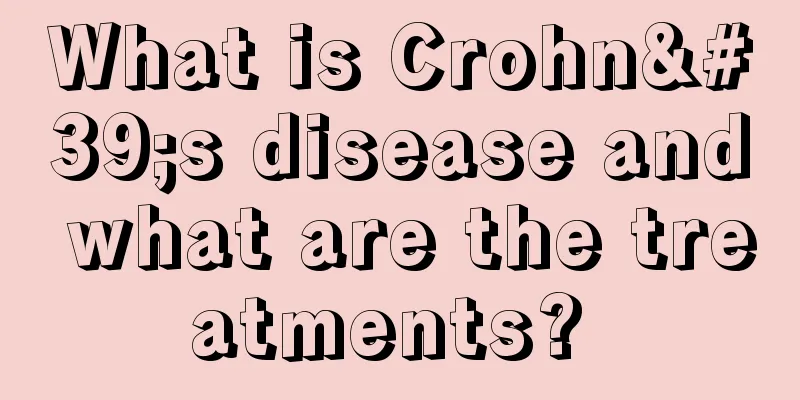Under what circumstances can I do IVF

|
What are the circumstances under which IVF can be performed? In vitro fertilization is a relatively common assisted reproductive technology. For some couples who are unable to conceive normally, they can achieve successful conception through in vitro fertilization. There are many indications for IVF. For example, if the woman is relatively old, or if one of the couple has some medical problems and cannot conceive normally, IVF can be used to achieve the goal of conception. What are the circumstances under which IVF can be performed? 1. Conventional in vitro fertilization-embryo transfer technology (first generation test tube baby) Applicable infertility conditions include: 1. Infertility caused by female fallopian tube factors. For example, if laparoscopy or hysterosalpingography confirms blockage and adhesion of the fallopian tubes; after tubal ligation; after ectopic pregnancy, bilateral fallopian tubes were removed; the fallopian tubes were originally blocked and no pregnancy has been conceived for more than one year after restoration of the blockage through interventional or laparoscopic treatment; the fallopian tubes were blocked but no pregnancy has been conceived for more than one year after treatment. It is difficult to conceive naturally due to the infertility caused by the above fallopian tube factors, so you can consider in vitro fertilization treatment as soon as possible. 2. Ovulation disorder. If there is no follicle growth on your own, there is no dominant follicle after drug-induced ovulation treatment; if there are mature follicles, but even with drugs that promote follicle rupture, the follicles cannot be discharged for three consecutive cycles. 3. Endometriosis. Patients with mild or moderate endometriosis have not responded to drug treatment for more than one year, or have not become pregnant after three cycles of artificial insemination; patients with severe endometriosis can directly choose test tube treatment after surgical diagnosis. 4. The man has oligospermia or asthenozoospermia. Semen quality does not meet the standards for natural conception or artificial insemination treatment. 5. Immune infertility. The man or woman has immune antibodies in his or her body, and drug treatment is ineffective or has not conceived after 3 cycles of artificial insemination. 6. Unexplained infertility. According to the existing examination methods, no cause of infertility can be detected, but the infertility lasts for more than 1 year and no pregnancy has occurred after 3 cycles of artificial insemination treatment. 2. Intracytoplasmic sperm injection (ICSI) is suitable for 1. The male has severe oligospermia, asthenospermia, or teratospermia. The quality of the man's semen is too low to undergo conventional in vitro fertilization (i.e., first-generation test tube fertilization). 2. The male has obstructive azoospermia. That is, there are no sperm in the semen, but active sperm can be obtained through epididymis or testicular puncture, and then you can have your own baby through second-generation test tube treatment. 3. Conventional in vitro fertilization fails. That is, sperm and eggs cannot fuse and fertilize each other when cultured in vitro. It is necessary to use the second-generation test tube method to inject a single sperm directly into the egg to fertilize the two. 3. Preimplantation genetic diagnosis PGD (third generation test tube baby) 1. If both parties suffer from a single gene-related genetic disease or chromosomal abnormality, the chromosomes of the embryo can be tested through the third-generation IVF technology to find out whether the embryo has a disease gene or chromosomal abnormality. Selecting embryos with normal chromosomes from a batch of embryos and transferring them back to the mother can avoid the birth of children with chromosomal abnormalities. 2. If there is a serious sex chromosome-linked hereditary disease, the sex of the embryo can be selected through third-generation test tube fertilization, and the embryo of the disease-free sex can be transferred into the uterus. If a certain disease is only transmitted to a specific gender, such as only to boys, then this technology can be used to select embryos. By selecting female embryos and transferring them into the uterus, it can be determined that a girl will be born, thus avoiding genetic diseases. |
Recommend
What medicine should I use for itchy blisters on the soles of my feet
There are many people with athlete's foot in ...
How to correctly prevent pituitary tumors
The body is the capital of revolution. People hop...
What are the steps to use baking soda to remove blackheads?
Blackheads are a type of open comedones, which ar...
Is the blood mark on the inner thigh AIDS?
Blood marks on the inner thighs may not necessari...
What to do if the film on glasses comes off
Glasses film peeling refers to the falling off of...
Is cycling more likely to cause testicular cancer?
There is no direct scientific evidence to show a ...
Can you eat dead mantis shrimp? A gourmet expert tells you
Mantis shrimp is one of the most common seafood. ...
Why do my eyes hurt at night?
Eye pain is still a common phenomenon in daily li...
What's going on with mental confusion
If your pace of life is too fast, or you are unde...
How to remove scale from pipes
In fact, pipes are also a place where scale accum...
What are the dietary taboos for ovarian cancer
Ovarian cancer is the disease that women fear the...
What to do if your eyes hurt due to overuse of eyes?
Eye fatigue is very common. Excessive use of the ...
How to Remove Old Fruit Stains
Maybe you have had the experience of fruit juice ...
How to check whether the bones are closed
Bones are an indispensable and important part of ...
How is the effect of TCM treatment for nasopharyngeal carcinoma
How is the effect of TCM treatment for nasopharyn...









